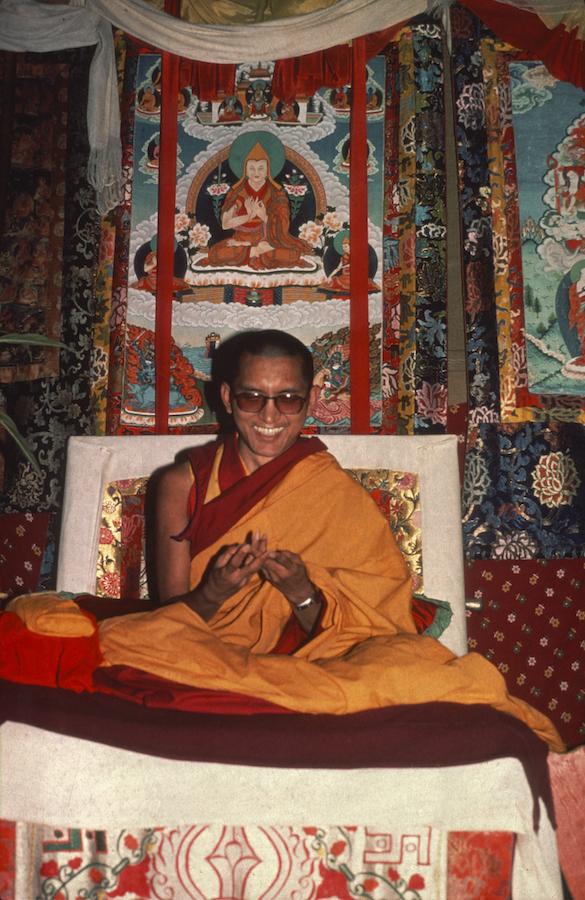Dear Friends,
Thanks so much for your interest in and support of the Lama Yeshe Wisdom Archive. Please feel free to share our monthly eletter everywhere!
Our forthcoming publication, The Nectar of Bodhicitta: Motivations for the Awakening Mind, is currently in production and will be shipped to us from the printers on September 10. This book presents Lama Zopa Rinpoche's teachings on bodhicitta, the mind of enlightenment, with verses and commentary on two inspiring texts, The Jewel Lamp: A Praise of Bodhicitta by Khunu Lama Rinpoche and A Guide to the Bodhisattva’s Way of Life by Shantideva.
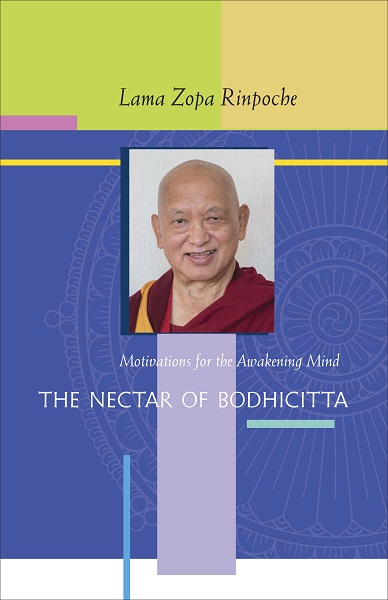 The story behind this book is that in the early Kopan courses, Rinpoche would start his day’s teachings by quoting a verse from Shantideva’s or Khunu Lama Rinpoche’s seminal texts, giving a short teaching on it and then suggesting that students use it to generate a bodhicitta motivation for the day’s activities (mainly teachings, meditations and discussion groups but also ordinary activities such as eating, talking, walking around and so forth). Since those days I’ve always thought that a compilation of these short teachings would make a great book, and finally, here it is, expertly compiled and edited by our very own Gordon McDougall, who, as usual, has done a great job with it.
The story behind this book is that in the early Kopan courses, Rinpoche would start his day’s teachings by quoting a verse from Shantideva’s or Khunu Lama Rinpoche’s seminal texts, giving a short teaching on it and then suggesting that students use it to generate a bodhicitta motivation for the day’s activities (mainly teachings, meditations and discussion groups but also ordinary activities such as eating, talking, walking around and so forth). Since those days I’ve always thought that a compilation of these short teachings would make a great book, and finally, here it is, expertly compiled and edited by our very own Gordon McDougall, who, as usual, has done a great job with it.
We want to sincerely thank all of you who have already contributed to help support this project. Your donations make a difference. Thank you! If you would like to contribute to Rinpoche’s amazing teachings on bodhicitta, for a donation of $50 or more we will send you a copy of the book as soon as we receive it from the printer.
On the LYWA Podcast: Compassion and Emptiness Together
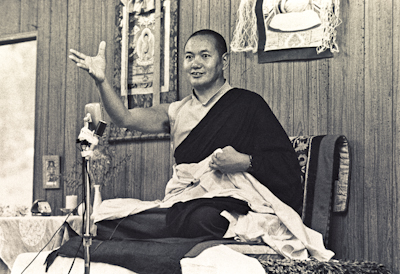 One must have the wisdom and method simultaneously developing.—Lama Yeshe
One must have the wisdom and method simultaneously developing.—Lama Yeshe
This month on the LYWA podcast we bring you teachings by Lama Yeshe given in Los Angeles in 1975. In this excerpt Lama describes the difference between Hinayana and Mahayana motivations and impresses upon us the importance of developing our wisdom in order to generate bodhicitta without dualistic emotional obstacles. Read along with the transcript here.
The LYWA podcast contains hundreds of hours of audio, each with links to the accompanying lightly edited transcripts. See the LYWA podcast page to search or browse the entire collection by topic or date, and for easy instructions on how to subscribe.
From the Video Archive: Lama Zopa Rinpoche leads nyung nä retreat at Lawudo
This month from the video archive we offer rare archival footage of Lama Zopa Rinpoche arriving at Lawudo in Nepal in 1990 and leading a nyung nä retreat. The local nuns including Rinpoche's mother greet Rinpoche and lead him to the gompa (meditation hall) where Rinpoche is offered a mandala. Rinpoche then gives a short introductory teaching on the importance of developing heartfelt compassion and the footage ends with scenes from the retreat itself and a glimpse of the expansive view of the mountains outside the gompa. You may also be inspired to explore Abiding in the Retreat, a compilation of Rinpoche's many teachings on the powerful method of developing compassion through the nyung nä practice.
Visit and subscribe to the LYWA YouTube channel to view dozens more videos freely available from our archive. See also the FPMT YouTube channel for many more videos of Lama Zopa Rinpoche’s teachings.
WHAT'S NEW ON OUR WEBSITE
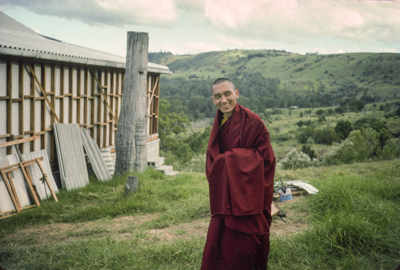 This month we have posted the first twelve lectures given by Lama Zopa Rinpoche at a one-month lamrim meditation course held at Chenrezig Institute, Eudlo, Australia, in May 1975. The course was based on The Wish-fulfilling Golden Sun, Rinpoche’s first lamrim book, and includes many checking meditations led by Rinpoche. This historic event, attended by 120 students, was the first meditation course at the center. Teachings were given in the barely finished gompa and the lamas stayed in caravans, while students stayed in tents and shacks on the property. The remaining eleven lectures and a PDF of the entire course are forthcoming.
This month we have posted the first twelve lectures given by Lama Zopa Rinpoche at a one-month lamrim meditation course held at Chenrezig Institute, Eudlo, Australia, in May 1975. The course was based on The Wish-fulfilling Golden Sun, Rinpoche’s first lamrim book, and includes many checking meditations led by Rinpoche. This historic event, attended by 120 students, was the first meditation course at the center. Teachings were given in the barely finished gompa and the lamas stayed in caravans, while students stayed in tents and shacks on the property. The remaining eleven lectures and a PDF of the entire course are forthcoming.
This month in our featured short video from FPMT's Essential Extracts series, Lama Zopa Rinpoche advises that the main purpose of retreat is to subdue the mind. Rinpoche says that the Buddha revealed the teachings so that we can become free from negative thoughts and achieve temporal and ultimate happiness. You can find links to the video here, or visit FPMT’s Essential Extracts webpage to browse the entire collection.
We also have new additions to Lama Zopa Rinpoche's Online Advice Book to share with you:
- A Healing Hut in Lahaul: This letter was sent to a government official from the Lahaul and Spiti district in Himachal Pradesh, India. Rinpoche wrote about his wish to build a rotunda or room for healing the sick and explained the Method to Transform daily practice.
- Goodbye Depression: Rinpoche gave this advice to a student who became depressed after a relationship breakup.
- Lamrim and Manjushri Practices for Mental Health: A student wrote that they had a mental illness and asked about practices for life. Rinpoche recommended effortful meditation on the basis of Lama Tsongkhapa’s lamrim texts, along with Manjushri prayers and mantras to develop wisdom.
- Coffee Shop in the Pure Land: Rinpoche sent this message to a family whose daughter was close to passing away.
Shipping Updates and News
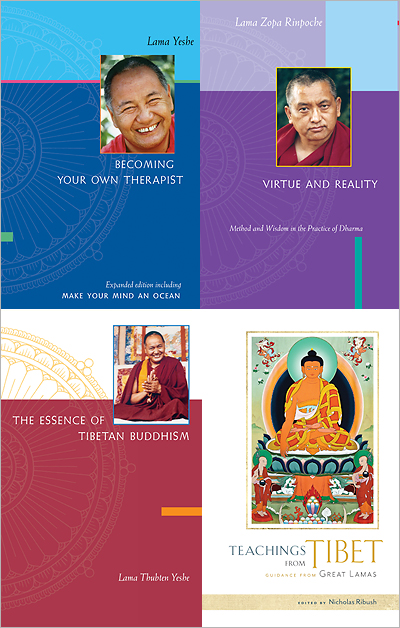 We have some news for our customers ordering print copies of our books. In July, the European Union implemented a policy whereby all incoming shipments are charged VAT. Previously, there was an exemption for items valued at less than $50, but now all shipments are subject to VAT. We must provide a value for the shipment (often times just $1) even if the books are free. So please be aware that when you order books from the Archive, the shipping cost you pay on our website will only cover transportation costs; you will be required to pay the associated VAT and fees once the shipment arrives to you.
We have some news for our customers ordering print copies of our books. In July, the European Union implemented a policy whereby all incoming shipments are charged VAT. Previously, there was an exemption for items valued at less than $50, but now all shipments are subject to VAT. We must provide a value for the shipment (often times just $1) even if the books are free. So please be aware that when you order books from the Archive, the shipping cost you pay on our website will only cover transportation costs; you will be required to pay the associated VAT and fees once the shipment arrives to you.
As always, there are alternatives to shipping from the US. Most of our books are available as ebooks from a variety of online vendors, and all of our free books can be read online, or downloaded as a pdf from our website. See our online store pages for links.
For our customers in Australia, there is a new option available to you. We recently learned that books ordered through Amazon’s print-on-demand service will be printed and shipped within Australia, keeping the shipping costs much lower than if the book was shipped from the US. The cost will be a bit higher for the book, but when combined with shipping, the overall cost may be lower for you.
Many of LYWA’s titles are available through Amazon’s print-on-demand service, especially those for which we are out of stock, such as Freedom Through Understanding and Kadampa Teachings. If you are a center and would like a larger shipment of any title that is low in stock, we can arrange for a small print run through Amazon at a discounted price. Email us for details.
As always, thank you so much for all your support and generosity. Please enjoy this month’s teaching, an excerpt from the forthcoming Nectar of Bodhicitta, and remember, if you’d like to support this project, please go here.
Big love,

Nick Ribush
Director
This Month's Teaching: WHATEVER WE FEEL, WE SHOULD REMEMBER BODHICITTA
Any emotion should come from bodhicitta
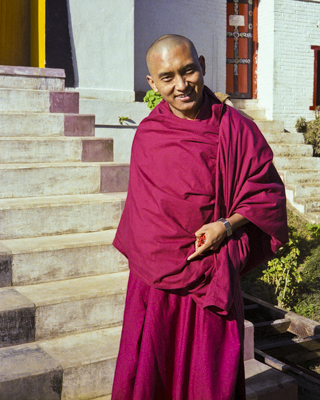 In the same way that whatever we do should be done with bodhicitta, whatever we feel should be imbued with bodhicitta. Physical or mental pain, physical or mental pleasure—any emotion, any state of mind whatsoever should never be separated from bodhicitta. Khunu Lama Rinpoche says this in various verses,
In the same way that whatever we do should be done with bodhicitta, whatever we feel should be imbued with bodhicitta. Physical or mental pain, physical or mental pleasure—any emotion, any state of mind whatsoever should never be separated from bodhicitta. Khunu Lama Rinpoche says this in various verses,
[89] When you are depressed, remember bodhicitta.
When you are scared, remember bodhicitta.
When you suffer, remember bodhicitta.
When you are happy, remember bodhicitta.[90] When your mind is weak, remember bodhicitta.
When you lose heart doing things for others, remember bodhicitta.
When you become lazy, remember bodhicitta.
When you get upset, remember bodhicitta.
The practice of Mahayana thought transformation (Tib: lojong), particularly the practice of taking and giving (Tib: tonglen), is a wonderful tool whenever there is a painful or negative emotion. By taking on the suffering of others and giving them all our virtues and happiness, we transform our selfish concern, the reason we have such a negative emotion, into the path to enlightenment.
This is what Khunu Lama Rinpoche is saying with these verses. When hardship makes us miserable, it is the self-cherishing mind hating the thought of having to bear that hardship that is the suffering, not the hardship itself. We can apply the techniques of thought transformation to any problem we have, from a slight headache to a heart attack or cancer. Even though we aren’t advanced enough to feel extremely happy about it, like the great thought transformation practitioners we can at least feel comfortable about the situation.
If we are depressed, we can remember bodhicitta and do the tonglen practice. We can meditate on the suffering of others and particularly on those beings who are also depressed but in a much worse state than we are. Then, in our tonglen meditation, we take all the depression of all the depressed beings right into our self-cherishing heart with the in-breath, in the form of disgusting black smoke or sludge or things like scorpions, and then with the out-breath we give them all the good qualities and happiness we have, in the form of bright white light. The self-cherishing gets heavier and heavier, denser and denser, blacker and blacker until it explodes into brilliant white light, pouring out of us and into the other beings. If we do this meditation properly there is no way we can stay depressed for even a second; the gloom of our depression is instantly dispelled by the sun of bodhicitta. We destroy our own depression and we generate great compassion for all other beings. This is how powerful such a meditation can be.
Remembering bodhicitta, whatever fear we have disappears. Even if we have leprosy, cancer, epilepsy or some other terrible disease—whatever dangers we face—there is no fear in our heart. Normal people are terrified because their health and wellbeing are threatened, but we experience the disease on behalf of all other sentient beings and hence it is not wasted; it becomes a very worthwhile thing to experience. Instead of rejecting the situation, our mind accepts it and uses it to develop bodhicitta even more. When we feel fear, instead of allowing it to overcome us, we face it and accept it not just for our own sake but for others, taking the fear of all other beings. With bodhicitta, the fear of death is totally transcended.
Whenever we feel fear, we should meditate on bodhicitta. We might face the terror of being bombed in a war, being in an earthquake or trapped in a burning house. If we ever find ourselves in such a terrifying situation, the best thing to do is meditate on bodhicitta. It is the most helpful thing, the very best preparation for whatever we are facing.
Even though we might have listened to many teachings on thought transformation, when we are told we have cancer or our partner leaves us, unless we remember bodhicitta, we will fall into misery because we see we are about to lose what we are so attached to. Bodhicitta, the mind that cherishes others, is the complete opposite of the self-cherishing thought, so when we meditate on bodhicitta all the fears that our attachment brings us cannot arise.
I remember there was a Swiss student who lived in Kathmandu who had very high blood pressure. I advised him to do tonglen. Each time he did this, and he usually did it for about half an hour, his blood pressure dropped a lot. This happened several times.
When high lamas are dying, they feel very happy, like they are going on a picnic or going back to their parents’ home, so of course there is no fear. Even if they have not reached that stage, they can still die happily, thinking that their next life will be an even better opportunity to develop on the path and benefit others.
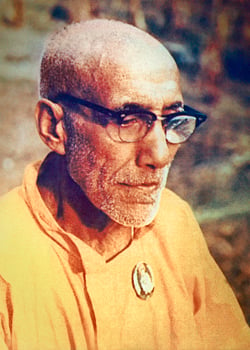 When we are happy, we still need to remember bodhicitta. This way whatever happiness we feel does not become confused with attachment and pride and other negative attitudes. Usually, we feel happy because we have obtained something we want, a desirable object, praise from others or the like, and this causes attachment to arise. Then our mind becomes disturbed, the very opposite of peace, and our self-cherishing increases. When we reflect on bodhicitta, however, the mind does not become agitated and self-cherishing, desire, pride, arrogance and the other afflictions do not arise in connection with that object of pleasure.
When we are happy, we still need to remember bodhicitta. This way whatever happiness we feel does not become confused with attachment and pride and other negative attitudes. Usually, we feel happy because we have obtained something we want, a desirable object, praise from others or the like, and this causes attachment to arise. Then our mind becomes disturbed, the very opposite of peace, and our self-cherishing increases. When we reflect on bodhicitta, however, the mind does not become agitated and self-cherishing, desire, pride, arrogance and the other afflictions do not arise in connection with that object of pleasure.
Furthermore, we can use that happiness, that experience, on the path to enlightenment by dedicating it to all other sentient beings. In that way we have no need to avoid pleasurable experiences. By constantly working for others, whatever we experience, whether it’s pleasant or not, is part of our path to enlightenment.
When we are weak, remembering bodhicitta makes us strong. Weakness comes from feeling inadequate, and when we are focused on helping others we develop strong willpower. Nothing is more important than helping them; that is our only wish, and hence we have no room for insincerity, carelessness and so forth. Feeling we can make a difference to others gives us great strength.
In that way, we overcome all laziness. At present there is a child’s voice inside us saying, “I don’t want to do any more meditation. I’m tired. It’s boring. It’s uncomfortable.” And so on and so forth. If we look, we can find many reasons not to meditate. Maybe it’s very cold in the morning and our bed is wonderfully comfortable. Laziness is not about being exhausted; it’s about finding ways of avoiding Dharma practice. Enjoying gossip more than talking about the Dharma is a form of laziness. There are many different types of laziness.
By reflecting on the great suffering of sentient beings and the great kindness they have shown us, there is no way we can be lazy. These kind mother sentient beings have helped us again and again in so many ways and now they are suffering in the terrible lower realms, as hell beings, hungry ghosts or animals, or even as human beings in suffering situations. They are utterly unable to help themselves; only we can do it.
Whenever we feel tiredness or laziness overcoming us, we should reflect on bodhicitta. Very often when I teach into the night, I see the students slouched over, their heads on their stomachs, not hearing a single word. With bodhicitta, this doesn’t happen. By remembering the kindness of sentient beings and the suffering they are enduring, all tiredness disappears and all we want to do is to work for them ceaselessly.
An excerpt from the forthcoming The Nectar of Bodhicitta. Compiled and edited by Gordon McDougall.























